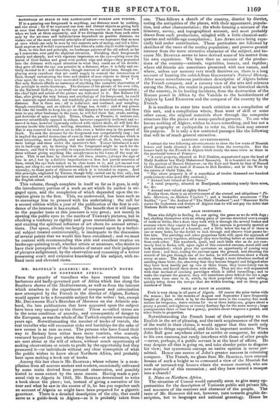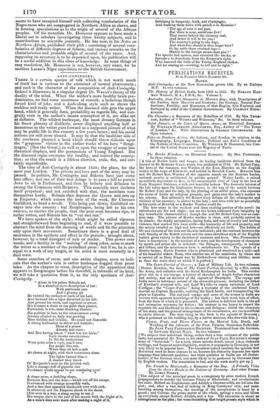MR. BLOFELD'S ALGERIA: MR. HODGSON'S NOTES ON NORTHERN AFRICA.
FROM the paucity of travellers who have ventured into the barbarous and badly-governed part of Africa which lies along the Southern shores of the Mediterranean, as well as from the interest which attaches to the experiment of conquest and colonization now attempted by the French in the district of Algiers, Barbary would appear to be a favourable subject for the writer : but, except Mr. DRUMMOND HAT'S Sketches of Morocco on the Atlantic sea- bord, the late publications that have appeared upon the subject have been very unequal to the theme. These so-called states are in the same condition of anarchy, and consequently of danger to the European, as was the whole of the Turkish empire some hundred years ago. Notwithstanding the number of books of travels, the real traveller who will encounter risks and hardships for the sake of new scenes is as rare as ever. The persons who have found their way to Barbary have either been mere tourists, who scarcely ventured beyond the port where they landed—or adventurers, who are sent about at the will of others' without much opportunity of making observations or minds to profit by the opportunity had they possessed it—or individuals without any clear conception of what the public wishes to know about Northern Africa, and probably bent upon making a book out of books. Among this last class is Mr. BLOFELD; whose volume is a com- pilation from all sources ancient and modern, occasionally enlivened by some traits derived from personal observation, and possibly tested to some extent by the same means. Having made a per- sonal visit to Algeria in 1843, Mr. BLOFELD determined to write a book about the place; but, instead of giving a narrative of his tour and what he saw in the course of it, he has put together such an account of Algeria as might have been prepared for a gigantic gazetteer. There is a detailed description of the city, that could serve as a guide-book to Algiers—as it is probably taken from
one. Then follows a sketch of the country, district by district, noting the antiquities of the places, with their appearance, popula- tion, and other characteristics ; the whole forming a mixture of the itinerary, survey, and topographical account, and most probably drawn from such productions, mingled with a little classical-anti-
quarian and middle-age compilation ; LEO AFRICANUS being espe-
cially laid under contribution. These particulars are followed by sketches of the races of the motley population ; and possess greater interest from the more attractive character of the subject, and be-
cause Mr. BLOFELD seems to have derived some of his matter from his own experience. We have then an account of the produc- tions of the country—animals, vegetables, insects, and reptiles; where old friends are sometimes presented with new names, and where, unless our memory very much deceives us, there is a long account of bunting the ostrich from GOLDSMITH'S Natural History
After some miscellaneous particulars descriptive of Algiers before the French conquest, and a cursory view of the arts and sciences
among the Moors, the reader is presented with an historical sketch of the country, in its leading incidents, from the destruction of the Roman power in Africa by the Vandals to the bombardment of Algiers by Lord EXMOUTH aod the conquest of the country by the French.
It is needless to enter into much criticism on a compilation of
this sort, and a compilation where, from want of skill or some other cause, the original materials show through the composite
structure like the pieces of a matty-patched garment. To one who knows nothing of Algiers, wishes to learn something, and has not a good geography or cyclopmdia to refer to, this book may answer his purpose. It is only a few scattered passages like the following that will be of much general attraction.
ALGERINE ACVERTISESIENTS.
I extract the two following advertisements to show the low rents of Moorish houses and lands situated a short distance from the metropolis. But the houses built by the French in Algiers fetch nearly the same rents as those in the provincial towns of France- " A rural property, situated at Deli Ibrahim, sequestrated upon the head of Hadji Kaddour ben Hadji Mahommed Spaoueldj. It is bounded on the North by the gardens of Hessen Ouharour ; on the East and South by that of Homed Oulid Mahadi and the road of Zouaou to Deli Ibrahim; and at the West by the estates of Oulid Tabs, &c. "The above property is of a superficies of twelve thousand one hundred yards (ninety-nine acres fifty centimes.)
" Annual rent valued at forty francs."
" A rural property, situated at Boudjareah, containing nearly three acres,. &c. &c.
" Annual rent valued at eighty francs." Besides these, there is an advertisement of the eternal and ubiquitous "pi- lules Morrison, ou Miclicin Vegetate"; and a bookseller announces "The Smiths," "par" the Author of "The Maid's Husband "; and "Monsieur Beille warns the tradesmen and dealers of Algiers that he will not pay the debts that Madame Beille may contract."
ARAB SPORTSMEN.
Those who delight in fowling do not spring the game as we do with dogs ; but, shading themselves with an oblong piece of canvass stretched over a couple of reeds or sticks, like a door, they walk with it through the several brakes anti avenues where they expect to find game. This canvass is generally spotted or painted with the figure of a leopard; and a little below the top of it there is one or more holes, for the fowler to look through and observe what passes be- fore him. The partridge and other gregarious birds will, upon the approach of the canvass, covey together, although they were feeding before at some distance from each other. The woodcock, quail, and such birds also as do not com- monly feed in flocks, will, upon sight of this extended canvass, stand still and look astonished ; which gives the sportsman an opportunity of coming very near them ; and then, resting the canvass upon the ground, and directing the muzzle of his gun through one of the holes, he will sometimes shoot a whole covey at once. The Arabs have another, though a more laborious method of catching these birds; for, observing that they become languid and fatigued after they have been hastily put up two or three times, they immediately run in. upon them, and knock them down with sticks. They are also well acquainted with that method of catching partridges which is called tunnelling; and to make the capture the greater, they will sometimes place behind the net a cage with some tame ones in it, which, by their perpetual chirping and calling, quickly bring down the coveys that are within hearing, and so decoy great numbers of them.
PRICE OF FRUIT IN ALGIERS.
Fruit is very cheap in all parts of Algeria. Of course the price varies with the season ; but in the months of August and September I have frequently bought at Algiers, which is by far the dearest town in the country, fine musk melons for twopence, water-melons for 'wo or three halfpence, grapes about a penny a pound, and eighteen or twenty Barbary figs for the same money ; large pomegranates three or four for a penny, peaches about twopence a pound, and other fruits in proportion.
Notwithstanding the French boast of their superiority to the English in the art of pleasing, and the tacit acquiescence of the rest of the world in their claims, it would appear that this merit only extends to things superficial, and fails in important matters. When John Bull goes anywhere either as settler or conqueror, he sticks to his own customs, but rarely interferes with those of other people —never, perhaps, if a public servant is at the head of affairs. He may despise all that is going on, and take slender pains to disguise his view; but systematic outrage on native opinion is never per- mitted. Hence one source of John's greater success in colonizing conquest. The French, we glean front Mr. aorsce, have erected houses of such a height as to command a view of the Moorish flat roofs or terraced-top houses where the women resorted, who are now deprived of this recreation ; and they have turned a mosque into a church!
2. Notes on Northern Africa. The situation of Consul would naturally seem to give many op- portunities for the description of Tunisean public and private life, and accounts of the manners and character of the people. The taste of Mr. HODGSON did not, however, turn towards graphic de- scription, but to languages and national genealogy. Hence he seems to have occupied himself with collecting vocabularies of the Negro races who are congregated in Northern Africa as slaves, and in forming speculations as to the origin of several of the African peoples. Of his materials Mr. Honosost appears to have made a liberal use to scholars investigating these knotty subjects, and in contributions to scientific journals. He has now, in his Notes on Northern Africa, published their pith ; consisting of several voca- bularies of different degrees of fulness, and various remarks on the characteristics and probable origin of several of the races. And, supposing its accuracy is to be depended upon, his publication will be a useful addition to this class of knowledge. In some things of easy resolution, Mr. HODGSON is not, however, very exact, for he ascribes LAIRD'S Niger expedition to the British Government.



























 Previous page
Previous page